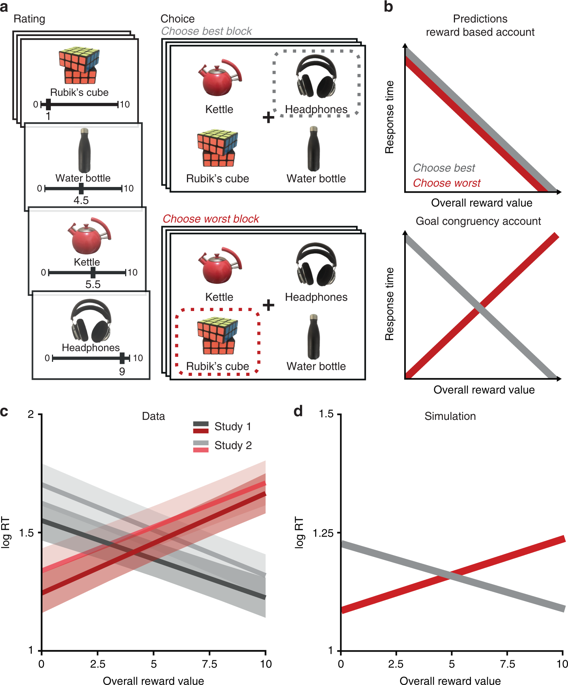当前位置:
X-MOL 学术
›
Nat. Commun.
›
论文详情
Our official English website, www.x-mol.net, welcomes your
feedback! (Note: you will need to create a separate account there.)
Goal congruency dominates reward value in accounting for behavioral and neural correlates of value-based decision-making.
Nature Communications ( IF 14.7 ) Pub Date : 2019-10-29 , DOI: 10.1038/s41467-019-12931-x Romy Frömer 1 , Carolyn K Dean Wolf 1 , Amitai Shenhav 1
Nature Communications ( IF 14.7 ) Pub Date : 2019-10-29 , DOI: 10.1038/s41467-019-12931-x Romy Frömer 1 , Carolyn K Dean Wolf 1 , Amitai Shenhav 1
Affiliation

|
When choosing between options, whether menu items or career paths, we can evaluate how rewarding each one will be, or how congruent it is with our current choice goal (e.g., to point out the best option or the worst one.). Past decision-making research interpreted findings through the former lens, but in these experiments the most rewarding option was always most congruent with the task goal (choosing the best option). It is therefore unclear to what extent expected reward vs. goal congruency can account for choice value findings. To deconfound these two variables, we performed three behavioral studies and an fMRI study in which the task goal varied between identifying the best vs. the worst option. Contrary to prevailing accounts, we find that goal congruency dominates choice behavior and neural activity. We separately identify dissociable signals of expected reward. Our findings call for a reinterpretation of previous research on value-based choice.
中文翻译:

在考虑基于价值的决策的行为和神经相关性时,目标一致性在奖励价值中占主导地位。
当在选项之间进行选择时,无论是菜单项还是职业道路,我们都可以评估每个选项的奖励程度,或与当前选择目标的一致性(例如,指出最佳选项或最差选项)。过去的决策研究通过前者来解释发现,但是在这些实验中,最有意义的选择始终与任务目标最一致(选择最佳选择)。因此,尚不清楚预期奖励与目标一致性在多大程度上可以解释选择价值的发现。为了弄清这两个变量,我们进行了三项行为研究和一项功能磁共振成像研究,其中任务目标在确定最佳选择与最差选择之间有所不同。与流行的说法相反,我们发现目标一致性主导着选择行为和神经活动。我们分别确定预期奖励的可分离信号。我们的发现要求对以前基于价值的选择的研究进行重新解释。
更新日期:2019-10-29
中文翻译:

在考虑基于价值的决策的行为和神经相关性时,目标一致性在奖励价值中占主导地位。
当在选项之间进行选择时,无论是菜单项还是职业道路,我们都可以评估每个选项的奖励程度,或与当前选择目标的一致性(例如,指出最佳选项或最差选项)。过去的决策研究通过前者来解释发现,但是在这些实验中,最有意义的选择始终与任务目标最一致(选择最佳选择)。因此,尚不清楚预期奖励与目标一致性在多大程度上可以解释选择价值的发现。为了弄清这两个变量,我们进行了三项行为研究和一项功能磁共振成像研究,其中任务目标在确定最佳选择与最差选择之间有所不同。与流行的说法相反,我们发现目标一致性主导着选择行为和神经活动。我们分别确定预期奖励的可分离信号。我们的发现要求对以前基于价值的选择的研究进行重新解释。






























 京公网安备 11010802027423号
京公网安备 11010802027423号